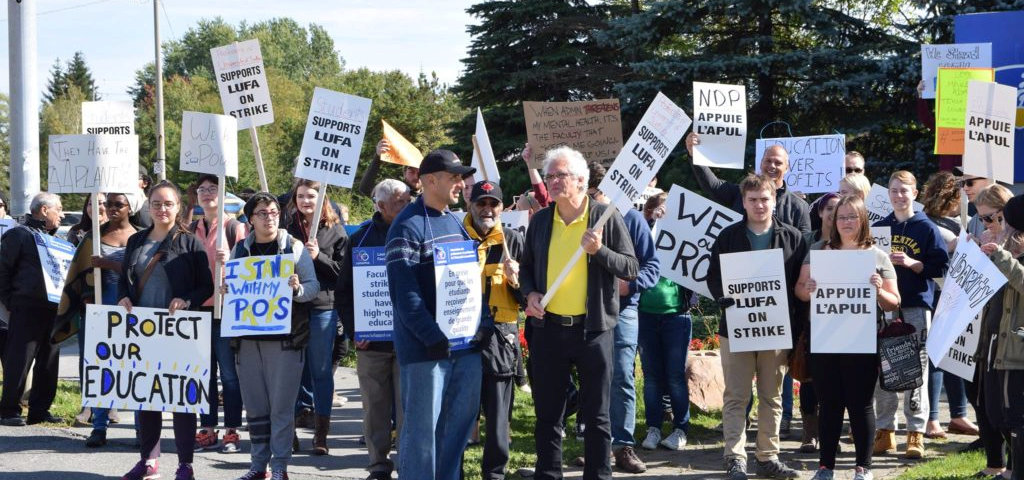April 12 is being called “Black Monday” by residents of Sudbury, Ontario. That was the day that Laurentian University publicized plans to cut 69 programs and issue mass layoffs which will impact at least 150 faculty and staff. Eight hundred students had their chosen programs cut out from under them, meaning they may have to find another school, change their program or drop out.
The Communist Party of Canada issued a statement in solidarity with all affected workers and students, while demanding immediate action by the Ontario and federal governments to “stop the insolvency proceedings and provide the stable funding needed for the university’s future operations with a full staff and continuing programs.”
Laurentian and the Ontario government are scurrying to place blame for the crisis on COVID-19, a small tuition fee reduction two years ago, financial mismanagement by a few and declining enrolment due to demographic challenges in northern Ontario. The real problem, though, lies in decades of neoliberal policies – the Communist Party points to “the creeping privatization of post-secondary education that has been carried out by Tory, Liberal and NDP governments alike across Canada for the last forty years.”
In addition to being important for the community of Sudbury, the struggle at Laurentian has great importance for the whole region and even across Canada. It represents a four-pronged attack – against labour rights and the rights of public sector workers, on the quality and democratic nature of post-secondary education, against French and Indigenous language and education rights, and on the people of Northern Ontario.
An dangerous new precedent in the attack on labour rights
For decades, universities across Canada have been undergoing neoliberal restructuring. One of the unique aspects of what is going on at Laurentian is that the university, in coordination with the Ontario government of Doug Ford, is using legal mechanism of the Companies’ Creditors Arrangement Act (CCAA) to impose an unprecedented breadth of deep cuts. As the Communist Party says, “They are pretending to fix a problem caused by neoliberal policies of their own making by doubling down and enacting even more brutal neoliberal restructuring.”
The CCAA, which is federal legislation, has been used against labour in the private sector to steal the unpaid wages and pensions of workers and ensure banks and corporate creditors are paid back first. This is the case with US Steel in Hamilton, Ontario and many other examples. But this is the first time that a public institution has used the CCAA.
Many have noted that this should be impossible since universities are not private businesses but public institutions that ought to be supported by public funding and oversight. Collective agreements at Laurentian have been opened up, salaries substantially reduced and workloads increased. The Communist Party, which has long opposed the CCAA and its use against private sector workers and unions, is calling on the labour movement to “defeat this dangerous weapon [now] being used against public sector workers.”
An attack on the quality of post-secondary education
The breadth of the cuts announced on April 12 is shocking. Of the 69 program cuts that were announced many of them included programs that are widely considered foundational to any university – Philosophy, Mathematics, Anthropology, Political Science and Physics, among them.
Many universities across the country have begun to cut these programs, in particular in the Arts, Social Sciences and Humanities. The Communist Party states that this has to do with how capitalism values – or undervalues – education:
“This reflects a fundamental difference in terms of how capitalists and working people view the importance of education. Education should not be a ‘personal investment’ or a commodity. Education is a democratic right and a social good. It is part of the common creative drive to seek out and expand knowledge which is valuable for individuals and society as a whole. While the capitalist attempts to limit education to equipping future employees with exploitable skills, we see education as a prerequisite to having a democratic society which needs a highly educated population where working people attend an accessible education system built for the public interest, not private interests. These cuts must be stopped and we must continue to fight for a diverse, quality, democratic, public education system. Schools across the country will face the same dismantling if this isn’t stopped.”
An attack on French and Indigenous rights
The Franco-Ontarian community is not new to fighting to protect and expand French language education. In 2018, the Ford government tried to stop the creation of Ontario’s first French language university, Université de l’Ontario français (UOF). A massive mobilization of the Franco-Ontarian community thwarted the government’s plan – one of the first items that the newly elected Ford government was forced to backtrack on – and the UOF accepted its first students in September 2019.
However, there is still a long way to go to get to adequate provision of French language education in the province to meet the needs of over 600,000 Franco-Ontarians. At the moment, Ontario has no fully French speaking university – UOF will not have its first cohort of full-time students until the fall, and its location in Toronto is far from the main Franco-Ontarian communities. In contrast, the English-speaking population in Quebec (which is comparable in number to the number of French speakers in Ontario) has three primarily English universities and seven English CEGEPs. For this reason, French speaking communities see the cuts at Laurentian, which will wipe out 45 percent of all French-language programs, as a major step backwards. The Communist Party calls this “a disproportionate attack on French programs. No programs should be cut, and some should be expanded, such as the bilingual midwifery program and other unique programs.”
Laurentian has also touted its “tri-cultural” mandate to reflect the university’s connection to the Indigenous communities of the North. Indigenous language use was encouraged on campus with Anishinaabemowin signage in addition to English and French. This also included an important Indigenous Studies program which is now facing defunding. The Communist Party says this is a sign that Indigenous peoples are facing the “widespread denial of education as a human and treaty right” across Canada.
An attack on Northern Ontario
The dismantling taking place at Laurentian is seen by many in Northern Ontario as yet another massive economic blow to the region. Bay Street sees Northern Ontario as a hinterland whose natural resources belong to mining companies to be exploited. But this approach tramples on the inherent and treaty rights of First Nations and condemns residents of the North to impoverishment. Expanding post-secondary education in Northern Ontario is a key component in a regional economic strategy to increase employment and raise living standards.
The Laurentian administration and some others have cited lower enrolment and declining population in the region, as a way to justify the cuts. However, as the Communist Party points out, tuition fees “are the biggest barrier to accessing education for working people.” The Party calls for eliminating tuition, to provide free education from early childhood to post-doctoral studies.
The Party also points to the need to balance enrolment between schools as another part of the solution – another one which the universities themselves are avoiding. “Instead of institutions competing with each other for students, who they regard as customers, governments can enact programs designed to balance enrolment in a planned way between schools to account for differences in regional growth.”
The big picture
The underlying structural cause of the crisis at Laurentian is decades of underfunding and privatization. This same problem exists across Canada. In Ontario, government funding dropped from about 80 percent of operating revenues in 1980 to about 50 percent in 2004 and to just over one-third in 2017. The picture is similar across the country. The Communist Party writes that, “tuition fees paid by students are now the largest source for university operating revenue, [marking] an enormous shift from public to private funding, with students graduating with tens to hundreds of thousands of dollars of debt.”
The Party points out that the Ontario government appears to be working with Laurentian to carry out these unprecedented attacks, but that the federal government “has also helped to create this crisis and must also take action to stop the cuts.” Federal funding for post-secondary education has dropped significantly since the 1970s. To reverse this, the Communist Party is demanding, “immediate increase in federal funding and a new ‘Post-Secondary Act’, similar to the Canada Health Act, which sets out cross-Canada standards for free and public post-secondary education.”
The Communist Party calls for mobilization and unity of the labour, student and democratic movements to “defeat this unprecedented attack and work to move on to the offensive to win free, accessible, quality, democratic public post-secondary education.”
Drew Garvie is Ontario leader of the Communist Party
[Photo of student solidarity with Laurentian faculty strike, 2017. Credit: Lambda student newspaper]
[hr gap=”10″]
Get People’s Voice delivered to your door or inbox!
If you found this article useful, please consider subscribing to People’s Voice.
We are 100% reader-supported, with no corporate or government funding.




